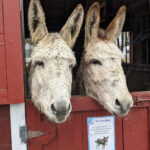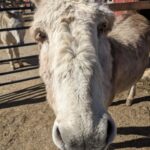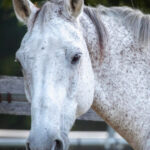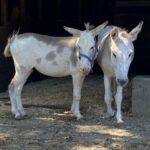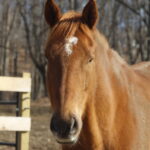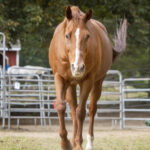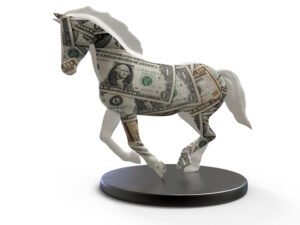 written by: Laura Strassman
written by: Laura Strassman
So you think you want a horse…
There are a lot of considerations for horse ownership and the expense of adopting or buying a horse can vary greatly – and will depend a good deal on what you want to do with the horse. However, even a free horse that is going to stand around and be decorative requires significant ongoing investment to feed, house, and care for them properly. It is generally true that the cost to adopt or buy a horse is less than the cost to keep it, and finances are the number one reason horses are turned in to rescue organizations.
The basic considerations for horse ownership:
Where will the horse live?
At your home?
If you have enough property and it is allowed in your town, you may be thinking that the horse will live at your house. Horses are heard animals and should have a companion. If you are looking to have a horse in your backyard you will need at least two. You will need to provide shelter for the horses, and also a place to store their food. Hay takes up a lot of space and must be kept dry and ventilated so it doesn’t go bad. Even if your horse will have 24/7 turnout, you will need to provide at least a 3-sided shelter for protection from the elements. You will need to have fencing and depending on your town regulations, you will probably consider the size of your turnout spaces – an acre for the first horse and a half acre for the second is considered the golden rule. The cost of fencing, installation, and maintenance varies with the type and if you have electric fencing there is the cost to power it, or cost of purchasing solar panels.
Don’t forget to consider manure containment/management. If your property is large enough you may be able to simply compost everything on your property, if not you will need to pay to have it hauled away.
There are also general operating costs to keeping horses in your backyard. Those costs include electricity and water, barn and fence maintenance, mowing, and properly caring for the grounds. There will also likely be insurance costs related to keeping a horse on the property.
Lastly, if you are thinking of keeping the horse at home you should be realistic about your ability to take on all of the chores on your own or if you need help. There is stall cleaning or less often pasture cleaning, feeding/watering, and property maintenance.
Somewhere else?
Arrangements range from rough board to full board with training. For rough board you do all the work (cleaning feeding, water, turn out ) and provide the materials (bedding if there is a stall, and food). For full board – typically there is a staff to do all the work and the cost of bedding and food is included. The costs can range from a low of about $100 per month (for pasture board in a rural area) to well over $1000 per month depending on services and location.
What do you feed your horse?
Horses do eat grass but you can’t simply bring a horse home and have them eat your lawn. A horse’s diet is not terribly complicated but they need a combination of forage along with some supplements such as salt/minerals and sometimes a grain, for added nutritional value. It’s best to consult your veterinarian when it comes to your horse’s diet and to know what it is currently eating to provide consistency during a change of location.
Hay and grain prices can vary considerably as with any crop. An average of $200 a month for feed is typical although specialty grains can be more expensive.
Routine medical care:
Just as humans need annual physicals, vaccines, and dental work, so do horses. Horses’ routine care includes vaccinations, dental care, deworming, and treatment for inevitable minor injuries or ailments. Horses tend to get into trouble in the strangest ways!
Dental care – “floating” should be done once to twice a year and ranges from around $75-$200 per visit.
Vaccines average around $200 a year and most vets will also perform a basic wellness check which will add to the amount.
Horses also need regular hoof care.
Even if your horse does not need shoes, you still need a farrier to come out and trim the feet properly. Trims range from $50+ depending on the farrier and how far they have to travel and are typically on a 4-6 week timing cycle depending on their hoof growth. Horses that have shoes typically need them looked at and reset or replaced every 4-8 week cycles. Shoeing can range $100-250 or more per cycle.
Other things that cost money beyond just keeping the horse:
Riding-related expenses:
Thus far we have just talked about considerations for keeping a horse, there is another category of expenses associated with riding one.
Equipment
If you are going to be riding the horse then you need the proper well-fitted equipment-saddle, bridle, for the horse, some riding boots, and clothes. You will also need a host of miscellaneous items such as brushes, and hoof picks, saddle pads, halter, lead rope etc… but the major expense in all of this is the saddle and bridle.
Lessons/competitions
If you want to pursue a particular riding discipline with your horse, then you will be taking lessons. Many full board facilities have a lesson a week requirement. Many people take more or fewer lessons but based on your goals you will want to consider lessons in your budget. Even if you are not riding, you may want some help with groundwork lessons to teach your horse good behaviors interacting with humans on the ground.
Competitions can be quite expensive entry fees, coaching, travel, and lodging all add up.
Informed horse ownership
The rewards of horse ownership are many and it can be the fulfillment of a lifelong dream. Whether that dream is to look out your kitchen window and see your horse outside in his paddock happily grazing or to go to the stables after a long day and tack up to practice your dressage test. It is however an undertaking that can affect your whole life. It is important to understand what you are getting into financially, and what you need to think about as you make decisions around horse ownership.
Source Material:
Bulletin #1004, Equine Facts: Guide to First-Time Horse Ownership
http://www.ckequinehospital.com/blog/122/How-much-does-it-cost-to-own-a-horse-#:~:text=Our%20vaccine%20recommendations%20for%20most,veterinary%20examination%20twice%20per%20year.


